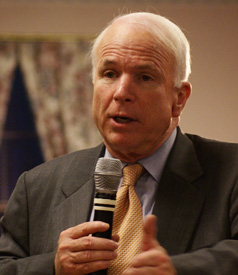This week, Cindy McCain caused a stir when she seemingly broke with her husband, Sen. John McCain (R-AZ), on the military’s Don’t Ask, Don’t Tell (DADT) policy when she appeared in an ad calling for repealing the ban on gays serving openly. As the ranking GOP member of the Senate Armed Services Committee, Sen. McCain has led Republican opposition to repealing DADT, so his wife’s high-profile call for repeal was noteworthy, especially considering that the Senate may take up the policy during the lame duck session of Congress, which begins tomorrow.
Cindy McCain later walked back her stance, saying she actually supports her husband’s position on DADT, which has for years been that he will “defer to our military commanders.” McCain has always said he will reconsider his stance on DADT “the day that the leadership of the military comes to [me]” and says it should be overturned. Yet, when the Chairman of the Joint Chiefs Adm. Mike Mullen and Defense Secretary Robert Gates came to McCain in February announcing they were in favor of repealing DADT, McCain invented a new condition — the completion of a study the Pentagon is conducting looking into the repercussions of repealing DADT.
Last month, reports surfaced that the study had found that a majority of American servicemembers would not object to serving alongside openly gay troops. Then this week, sources familiar with the study, which is to be released in December, told the Washington Post that the study had concluded that repealing DADT will not disrupt the military during a time of war. But appearing on NBC’s Meet the Press today, McCain yet again moved the goal posts, deploying his latest stumbling block to repeal. The problem? The study McCain demanded is now not good enough:
MR. GREGORY: That said, seven in 10 members of the military think it would be just fine to have it lifted.
SEN. McCAIN: Yeah. You and I have not seen that study. And this study was directed at how to implement the repeal, not whether the repeal should take place or not. But, very importantly, we have people like the commandant of the Marine Corps, the three other–all four service chiefs are saying we need a thorough and complete study of the effects–not how to implement a repeal, but the effects on morale and battle effectiveness. That’s what I want. And once we get this study, we need to have hearings, and we need to examine it, and we need to look at whether it’s the kind of study that we wanted. It isn’t, in my view, because I wanted a study to determine the effects of the repeal on battle effectiveness and morale. What this study is, is designed to do is, is to find out how the repeal could be implemented. Those are two very different aspects of this issue.
Watch it:
“McCain seems to be saying he wants a do-over because he doesn’t like the findings and recommendations in the Pentagon report going to Secretary Gates,” the Servicemembers Legal Defense Network, a gay rights legal group which works to end DADT, said in a statement responding to McCain today. “In other words, McCain is telling the Pentagon: Keep working until you produce the outcome I’m looking for.”
Keep non-commercial media alive and strong! Contribute to Truthout today by clicking here.
Despite what McCain might think, the military has confidence in the quality of its study. Even the Marine Corps commandant, Gen. James Amos, to whom McCain refers during the Meet the Press interview, disagrees with McCain on the study. In September, during Amos’ confirmation hearings, McCain tried to get Amos to cast doubt on the study. But Amos rebuffed McCain, saying he was confident in it. And despite the fact that he personally opposes repealing DADT, Amos expressed no reservations about enforcing a new policy, saying, “If this policy is changed. The last thing you’re going to see your Marine Corps do is try to step in and push it aside. That will simply not be the case.”
Press freedom is under attack
As Trump cracks down on political speech, independent media is increasingly necessary.
Truthout produces reporting you won’t see in the mainstream: journalism from the frontlines of global conflict, interviews with grassroots movement leaders, high-quality legal analysis and more.
Our work is possible thanks to reader support. Help Truthout catalyze change and social justice — make a tax-deductible monthly or one-time donation today.
